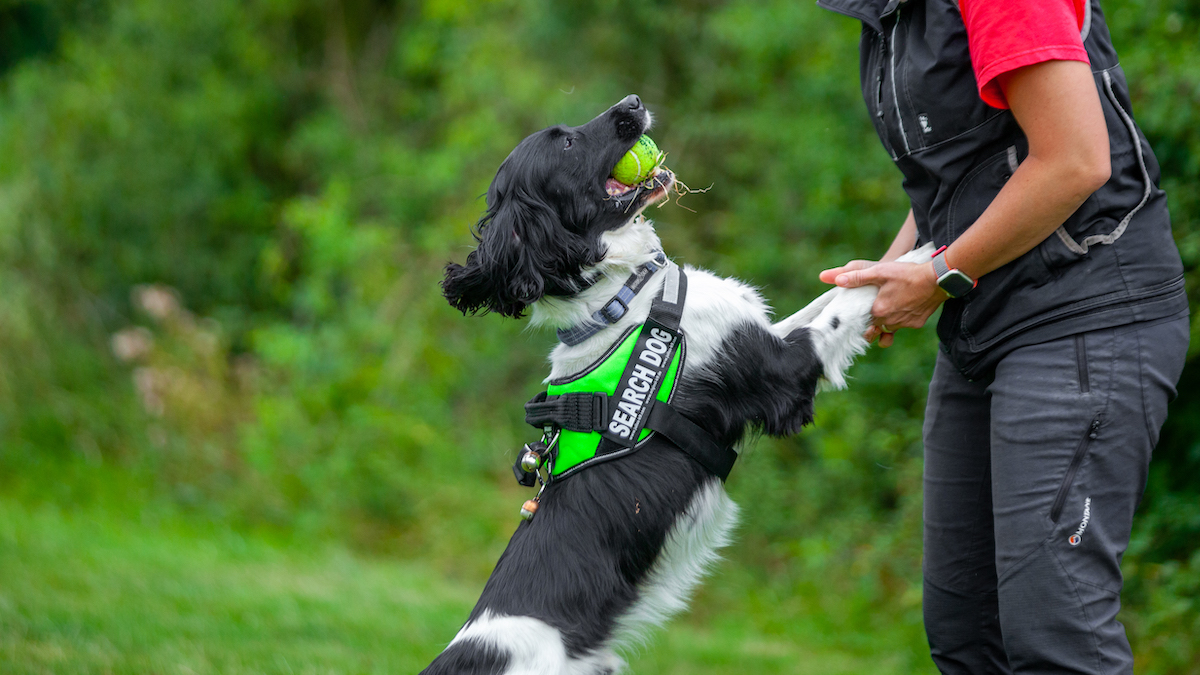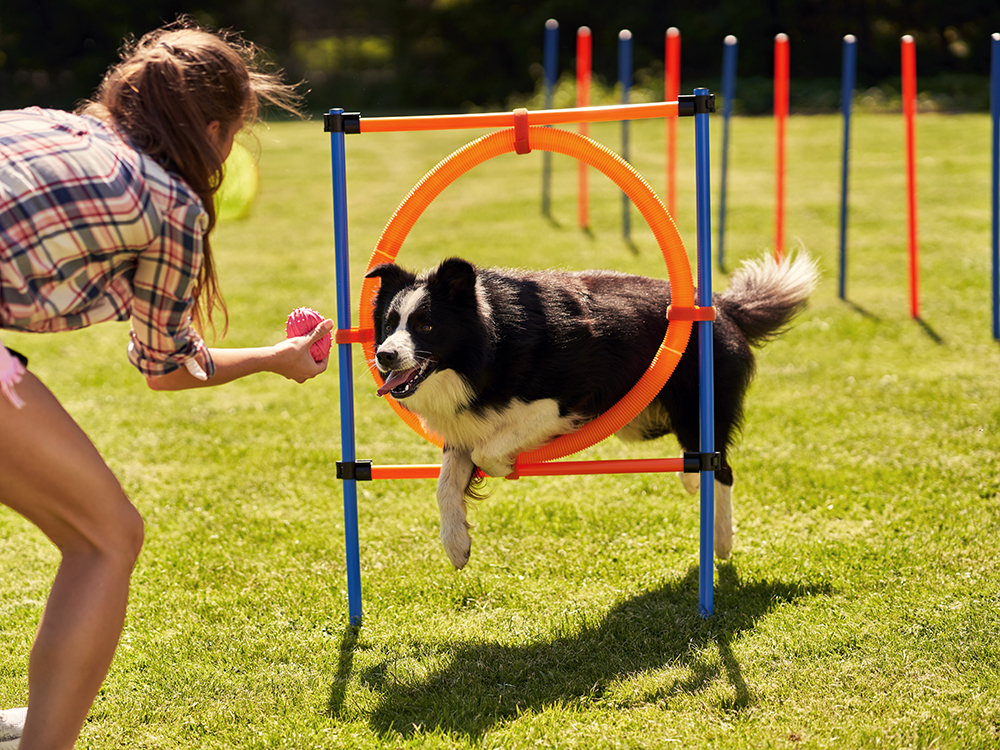Dog Training Solutions That Work for All Temperaments
Dog Training Solutions That Work for All Temperaments
Blog Article
The Ultimate Overview to Pet Training: Change Your Pet's Behavior
Effective pet dog training is necessary for promoting an unified connection between family pets and their proprietors. This guide not just intends to equip you with the needed tools to change your dog's habits but also welcomes you to check out just how these foundational principles can lead to a much deeper link with your animal.
Comprehending Canine Actions
Understanding canine behavior is essential for reliable training and a harmonious connection in between pet dogs and their owners. A pet dog's behavior is affected by a combination of genes, setting, and experiences. Dog training. Identifying these factors allows owners to tailor their training approaches to satisfy the specific requirements of their pets
Pets communicate mostly through body language, vocalizations, and faces. A wagging tail can show excitement or joy, while a put tail may indicate worry or entry. Observing these hints allows proprietors to respond properly, enhancing positive behaviors and resolving unfavorable ones successfully.
Additionally, comprehending the social structure of canines can provide understandings right into their habits. Pet dogs are pack pets, and they thrive in an organized setting. Establishing regular guidelines and clear borders can prevent confusion and promote a complacency.
Additionally, recognizing the natural instincts of pets, such as need to dig or chase after, is crucial. These instincts can be rerouted through appropriate outlets, such as play or exercise. By thoroughly comprehending these behavior aspects, proprietors can cultivate a positive training experience, inevitably causing a well-adjusted and obedient canine friend.
Necessary Training Techniques
Reliable pet training depends on a variety of essential techniques that can substantially enhance the understanding procedure for both the pet dog and the proprietor. One basic strategy declares reinforcement, which includes gratifying desirable actions with deals with, praise, or playtime. This method urges dogs to duplicate the behaviors that cause favorable results, fostering a trusting relationship between the pet and owner.
Another secret technique is consistency in expectations and commands. Utilizing the exact same verbal cues and hand signals helps the pet understand what is called for, minimizing complication and promoting quicker discovering. In addition, establishing clear borders and regulations is vital for reliable communication.
Socializing is also a crucial element of training. Subjecting pet dogs to various settings, individuals, and other pets assists them develop appropriate social skills and lowers anxiety in unknown scenarios.
Lastly, perseverance and timing are important. Training sessions need to be constant yet quick, guaranteeing that the pet continues to be involved and receptive. By using these crucial methods, proprietors can develop a favorable and structured training experience that advertises etiquette and enhances the bond with their canine friends.
Producing an Educating Schedule
Exactly how can a well-structured training timetable boost a pet dog's understanding experience? A training schedule gives uniformity, ensuring that pets receive normal, concentrated direction. This predictability helps pets understand what is expected of them, enhancing their learning and allowing for better retention of commands and actions.
When producing a training schedule, it is important to take into consideration the canine's age, breed, and private personality. Young pups may benefit from shorter, much more regular sessions, while grown-up pet dogs might love longer, much less regular training periods. Integrating a variety of activities can also keep the sessions engaging, stopping boredom and promoting interest for knowing.
Furthermore, organizing training sessions at certain times of the day can help solidify a routine. For circumstances, combining training with daily strolls or play can develop a positive association with knowing. It is additionally essential to include time for reinforcement, such as treats or appreciation, to award wanted actions promptly.
Lastly, versatility is essential. While consistency is crucial, being adaptable to the dog's state of mind or power level can enhance their discovering experience. A well-crafted training routine ultimately lays the structure for effective communication and a stronger bond between the pet dog and owner.
Typical Educating Challenges
In spite of having a well-structured training routine, pet dog owners usually come across various difficulties throughout the training process. One usual concern is inconsistency in commands and cues. When numerous member of the family make use of various terms or tones, a canine may come to be confused, hindering its capacity to learn properly.
One more constant obstacle is diversion. Dog training. Canines are normally interested animals, and outside stimulations such as other animals, sounds, or individuals can divert their interest during training sessions. This requires owners to produce a controlled setting or slowly present disturbances to reinforce focus
Furthermore, varying power levels can impact training outcomes. High-energy pets might have a hard time to settle and focus, while more easygoing breeds may need added inspiration to involve. Tailoring the training technique to fit the specific pet dog's temperament is necessary for success.

Structure a Strong Bond
A solid bond in between a pet dog and its owner is essential for effective training and total wellness. Dog training. This connection fosters trust, which is important for efficient interaction during click to find out more the training procedure. When a pet dog really feels linked and safe to its proprietor, it is most likely to react positively to commands and signs
To develop this bond, consistency is crucial. Establishing a routine that includes routine feeding, workout, and training sessions aids develop a sense of stability. In addition, favorable reinforcement methods, such as treats, appreciation, and play, reinforce wanted behaviors while strengthening the emotional connection.
Socialization go to this website is an additional crucial element of bond-building. Subjecting your canine to various environments, individuals, and various other animals assists them really feel a lot more positive and comfy, improving the bond with their owner. Participating in tasks with each other, such as walking, playing fetch, or participating in obedience training, promotes team effort and shared pleasure.
Final Thought

Comprehending pet dog actions is necessary for reliable training and a harmonious connection in between canines and their owners.Efficient dog training depends click here to find out more on a variety of important strategies that can significantly boost the understanding process for both the dog and the owner.Regardless of having a well-structured training timetable, canine proprietors usually encounter different challenges throughout the training procedure.In conclusion, effective dog training counts on a comprehensive understanding of canine habits, the application of crucial methods, and the establishment of a structured training routine. By stressing favorable reinforcement and uniformity, pet owners can dramatically enhance their family pets' behavior, inevitably guaranteeing a harmonious connection and advertising the well-being of both the pet and its setting.
Report this page